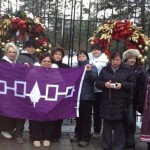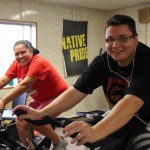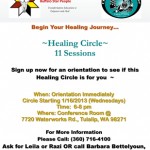The Washington State Transportation Commission met December 7, 2012 to review Traffic and financial reports and toll rate schedules for both the Tacoma Narrows Bridge and State Route 520. With the Toll fees bringing in a good amount of money they turn to the shrinking income from the gas tax. They discussed how to work a possible plan and budget which would introduce a Road Usage Charge (RUC) and in place of a gas tax. The RUC was proposed by the Road Usage Charge Steering Committee which is recommending a full investigation from 2013 to 2015 on how a the RUC work. The Commission’s study is assessing the feasibility of a future transition from the gas tax to a system that would charge drivers by the miles of road traveled, rather than by fuel consumption.
Weather Warning – Cold / Possible Snow
The Northwest Weather Service (NWS) has issued a Special Weather Statement for colder temperatures and a chance of lowland snow from tonight through the weekend
The Puget Sound Convergence Zone (PSCZ) is forming and we may see 0 to 3 inches of lowland snow (mainly above 400 foot level) accumulation late tonight through tomorrow. NWS indicates this could impact from North Seattle along the I-5 corridor to Bellingham.
Areas at higher elevations and the further north/east in the region may see larger amounts of snowfall. Also please note that accurate forecasting for snow relating to the PSCZ is very difficult; be prepared for some areas to receive amounts greater than 3 inches.
Drier conditions will move in behind these systems, but cold temps may keep any snow accumulations around as daytime highs will only make the mid-30s through Monday.
There also is a possibility of another round of snow on Saturday, but it really depends on which track this system takes.
Please be prepared for widely varied winter driving conditions throughout the County and allow extra time in your travels.
Native Owned company part of the New York Stock Exchange
By Monica Brown
On August 25, 2011, NativeOne became the first Native American owned trading institution of the New York Stock Exchange (NYSE). Don Lyons and Dennis Smith are the co-founders of NativeOne. Lyons is a member of the Morongo Band of Mission Indians located in Cabazon California while Smith has over 30 years experience in financial capital markets and investment advisory services and 12 years of working as a financial advisor for tribes.
NativeOne offers a unique opportunity, as their company states, “Your company simply requests their funds managers to direct a portion of their trading activity to the NativeOne Institutional Trading Desk or directly to our traders on the NY Stock Exchange. NativeOne will donate a portion of its net profits in the name of your company every quarter to these causes. This could give your company continued positive publicity in Indian Country at no additional cost to your company.”
NativeOne services include Equity and Fixed Incomes sales and trading along with offering internships. As part of their Mission statement NativeOne is aimed to level the financial playing field for all native tribes and Canadian First Nations while delivering the very best financial services to its institutional customers.
“One of the goals of the NativeOne companies is to collaborate with Tribes towards achieving greater participation in the financial services industry while promoting the economic advancement of Native American Tribes, Canadian First Nations Tribes, their members and communities” states Lyons.
While tribes don’t always have the knowledge to manage the money they will use money managers. The money managers, in buying and selling stocks, cannot make the trades themselves and will need to go through a broker-dealer. NativeOne, as a broker-dealer is able to buy and sell stocks, bonds, options or government securities for tribal money managers, if the tribal chief financial officer directs them to do so.
Early this month Oregon Health & Science University invited NativeOne to participate in their recent $126,365,000 bond underwriting.
“NativeOne’s inclusion in this underwriting is a groundbreaking achievement”, said Tiani Osborn, Managing Member of NativeOne and former Chairwoman of the Investment Committee for the Eastern Band of Cherokee Indians. “We are paving the way for Native Americans as they assume an active and meaningful role as capital markets participants”.
Visit their website here,
Mohawk Women Forge Solidarity in Visit to Chief Spence
Gale Courey Toensing, http://indiancountrytodaymedianetwork.com
January 09, 2013

Eleven women elected Mohawk chiefs visited Attawapiskat Chief Theresa Spence in her hunger strike tipi in Ottawa on December 18 and delivered a letter to Prime Minister Stephen Harper supporting Idle No More and demanding that he meet with Spence and address the issue of an unprecedented series of laws that many feel are oppressive and insulting to First Nations.
A delegation of women chiefs from three Mohawk Nation communities visited Attawapiskat Chief Theresa Spence during the second week of her hungry strike last month to offer her their support and respect and in doing so forged a new alliance among themselves.
Kahnawà:ke Chiefs Rhonda Kirby, Kahsennenhawe Sky-Deer, Christine Zachary-Deom and Gina Deer, Kanesatake Chiefs Sonya Gagnier, Shannon Nicholas, Sheila Bonspiel, Akwesasne Chiefs Karen Loran, Louise Thompson, April Adams-Phillips and one other unnamed woman chief from Akwesasne traveled on December 18 to meet with Chief Spence in her tipi on Victoria Island in Ottawa where she had promised to fast on water and medicine tea until Prime Minister Stephen Harper meets with her and other First Nation leaders to talk about the federal government living up to its promises and responsibilities toward Indigenous Peoples. That meeting is now scheduled for January 11.
Spence’s hunger strike and the Idle No More movement were sparked by the passage in the Canadian legislature of the Bill C-45 with inadequate consultation with the nations. The bill amends the Fisheries Act, the Canadian Environmental Protection Act, the Navigable Waters Protection Act and the Canadian Labour Code in ways that erode Indian sovereignty and control over their lands and resources. First Nations reacted immediately and strongly to the passage with protests and demonstrations across the country that have now spread in Idle No More solidarity rallies in the United States, Europe, the Middle East, New Zealand and even Japan.
Sky-Deer said the visit to Spence created an unprecedented bond of solidarity among the women Mohawk chiefs. “I think one of the most positive aspects of it was that it brought together the women leadership from our three Kanienkahaka (Mohawk people, the People of the Flint) communities, which otherwise may not have happened like that. It was a first meeting for all of us,” said Sky-Deer. Was the meeting the beginning of something new and great? “I hope so!” she said. “We’ve talked about continuing this in the New Year and maybe meeting again, because we face a lot of the same issues in our respective communities and it only helps us to strengthen and support each other in that we’re all Kanienkahaka women and have the best interest of our community and taking care of business. It was definitely a positive thing.”
Before traveling to Victoria Island, the women chiefs coordinated the gifts they would bring to Spence – tobacco, medicine bundles, eagle feathers and a big confederacy blanket that the Kahnawà:ke council donated, along with a confederacy flat that was hoisted on the palisades around the area where her tipi was located, Zachary-Deom said. “There was a big fire going near the tipi. She’s on very low lying ground, very moist and foggy and wet. I don’t know how healthy it is for her there. We were scheduled to see her at 2 p.m. but then we were told she had so many visitors and had just gone to bed,” Zachary-Deom said. So the women delivered letters from the Mohawk Council to Harper and Governor General David Johnson, the representative of the British Crown in Canada.
“The Mohawk Council of Kahnawà:ke has grown increasingly concerned with the paternalistic legislative approach that Canada has taken regarding First Nations affairs, which is in conflict with not only our inherent self-determination, but is also a violation of the agreements between our People and the Crown,” the council wrote. “The recent passage of the Omnibus Budget Bill C-45 is an offensive action on Canada’s part that is causing an obvious and serious deterioration in First Nations/Canada relations. The unwillingness to take corrective measures and continue to consider legislation impacting First Nations only promotes further dissension. At this time, we feel obligated to caution Canada that continuation of this unilateral and paternalistic approach will only result in further deterioration and dissent amongst First Nations Peoples.”
After delivering the letters, the women chiefs returned to Victoria Island and after a long wait finally got to meet with Chief Spence. “We gave her our message of support and comforted her with the blanket we brought that we wrapped around her. We told her that whatever she needed she would just have to tell us and the Mohawks would support her,” Zachary-Deom said.
Each woman had the opportunity to speak individually to Spence, Sky-Deer said. “We each brought our own messages and words of support in how she inspired us, being a woman leader herself, and, you know, just the feeling in that tipi, to have 12 women there together and sharing the weight of what we carry for our communities and wanting to see the best things for our people and our future generations – it was a very positive, very uplifting, powerful experience,” Sky-Deer said.
The women said they hoped the meeting of the First Nations chiefs with the Harper government would result in some changes in the way the federal government conducts itself. “We hope to have a more direct relationship that’s not just them making decisions and passing legislation without consultation that directly affects people – our people and Canadians – across the country,” Sky-Deer said. “It’s very unilateral and it doesn’t take into account and consideration the long term effects that will happen. I’m hoping for the best. I’m hoping for maybe some repeal if the Harper government can understand what we’re looking at and what we want to protect.”
Get fit at the Tulalip Conditioning Center

By Jeannie Briones, Tulalip News staff
Since the opening of the Tulalip Conditioning Center five months ago, community members have taken advantage of the various exercise equipment that the center offers, including treadmills, elliptical bikes, recumbent bikes, a heavy punching bag, speed bag, dumbbells, bench press, curling bench, ab crunchers, and other devices to provide an overall well-balanced workout.
“This center provides a healthy and safe program for our community. Diabetes run within Native American communities, so my main objective is providing somewhere the community can workout for free and feel safe at the same time,” said Josh Fryberg, Youth Services Recreation.
“I am thankful to have the opportunity to workout. I have kids and can’t workout at home, so I want to take advantage of this time,” said Tulalip Tribal employee Jadah Milam.
To better ensure that folks meet their health goals, Josh encourages people to workout in pairs and set weekly obtainable goals.
The Conditioning Center is available at no charge to tribal members, tribal employees, and community members. The center is open Monday through Friday, usually from 12:00 – 4:30 p.m., but hours may vary at different times throughout the week.
The Center is located at 7730 36th NW Ave W, Tulalip, WA 98271 (across from the Tulalip Boys & Girls Club). For additional questions, please contact Josh Fryberg at 425-377-4110.
Jeannie Briones: 360-716-4188; jbriones@tulaliptribes-nsn.gov
Are you or is anyone in your family interested in becoming part of a Healing Circle?
 Buffalo Star People is a Native nonprofit, based in South Dakota, dedicated to helping our relatives heal from losses, traumas, and addictions. Buffalo Star People has been helping Native people in tribal communities transform their lives in powerful ways for over 7 years. They are here in our community to facilitate a series of Healing Circles for about 11 weeks, ending in a graduation ceremony. Participants and mentors will be guided in a new approach to healing. Please consider joining us on this healing journey.
Buffalo Star People is a Native nonprofit, based in South Dakota, dedicated to helping our relatives heal from losses, traumas, and addictions. Buffalo Star People has been helping Native people in tribal communities transform their lives in powerful ways for over 7 years. They are here in our community to facilitate a series of Healing Circles for about 11 weeks, ending in a graduation ceremony. Participants and mentors will be guided in a new approach to healing. Please consider joining us on this healing journey.
Want to learn how? Our Healing Circles are free, and open to adults ages 18 and up. The only requirement is that you complete an orientation with a facilitator. Barbara Bettelyoun, Rosebud Sioux, is a Doctor of Psychology and has worked with Native communities on issues of trauma and healing for over 15 years. She co-facilitates with her husband, Francis. Francis Bettelyoun, Oglala Lakota and enrolled in the Ihanktonwan Sioux Tribe, is Vice President of Buffalo Star People Nonprofit, and has been co-facilitating Healing Circles for the past 7 years.
Orientation appointments immediately available for exploring the Healing Circle starting on 1/16.
Call to schedule a time that works for you:
Leila or Razi can be reached at 716-4100
Group co-facilitator Barbara Bettelyoun can be reached direct at 605-201-7576
Empowering Women – Artisan Cooperatives That Transform Communities
Special Upcoming Exhibit at the Seattle Burke Museum
June 15, 2013 – Oct. 27, 2013
One Moroccan artist teaches a village of women to read. An embroiderer from India takes out her first loan. A Hutu woman from war-torn Rwanda works with a Tutsi to make “peace” baskets. And a soup kitchen for aids orphans delivers meals because of a folk art cooperative’s success in Swaziland.
From Africa to Asia to the Americas, female artisans are creating grassroots cooperatives to reach new markets, raise living standards, and transform lives.
Empowering Women provides an intimate view of the work of ten such enterprises in ten countries. This exhibition illustrates how the power of such grassroots collaborations transform women’s lives, bringing together first-person quotes, stellar photographs, and stunning examples of the cooperatives’ handmade traditional arts.
Also on exhibit at the Burke Museum is Pacific Voices
The Pacific Northwest is home to a rich tapestry of cultures. In Pacific Voices, you’ll learn about seventeen different Pacific Rim cultures and how they adapt and remain vibrant in a changing modern world. Here you can learn about the revival of a dying language, hear the teachings of tribal elders, view beautiful Asian art, and learn about the ceremonies vital to cultural identity. The exhibit show-cases a wide variety of interesting artifacts from Washington State and around the Pacific Rim.
An excellent sampling of Northwest Coast Native art is currently on view in the Pacific Voices exhibit.
Hours
Open daily, 10 am – 5 pm.
On the first Thursday of each month, the museum stays open until 8 pm—and admission is free.
Closed: Christmas Day (Dec. 25), New Year’s Day (Jan. 1), July 4th, Thanksgiving Day.
Early closing: Museum closes at 3 pm on December 24 and December 31.
Weather closure: During inclement weather, call the museum after 10 am (206-543-7907) to confirm it is open.
Admission
General Admission
$10 general, $8 senior, $7.50 students (w/ID), and youth (5 & up)
FREE to Burke Members, children 4 and under, and UW staff/faculty/students
Free Admission—First Thursdays
Admission is free to the public on the first Thursday of each month.
Group tours may not be scheduled on these days.
Location and Directions
The Burke Museum is on the University of Washington campus at the corner of 17th Avenue NE and NE 45th Street.
From I-5, exit east onto NE 45th Street. Travel east on NE 45th Street to 17th Avenue NE. Turn right onto 17th. The museum will be immediately on your right.
From Highway 520, exit north onto Montlake Boulevard NE. Turn left onto NE Pacific Street. Turn right and head north on 15th Avenue NE. Turn right and head east on NE 45th St. Take your next right on 17th Avenue NE. The museum will be immediately on your right.






